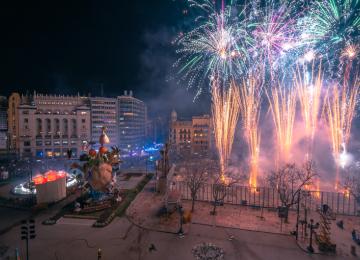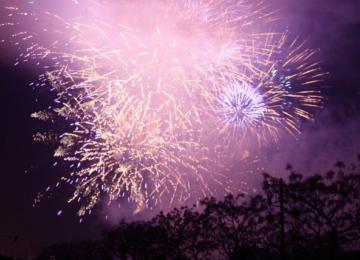Discover all the questions and answers about the Fallas of Valencia. What are the Fallas, the mascletàs, the ninots... everything you need to know about the festival.
Fallas of Valencia
The Fallas of Valencia: Festival declared Intangible Heritage of Humanity
From the 1st to 19th March, Valencia is overturned by Fallas celebrations, a festivity that combines tradition, satire and art which shouldn’t be missed for anything in the world. Read on to learn where our passion for fire and fun comes from and you’ll be ready to enjoy Fallas like a Valencian.
ORIGIN OF THE FALLAS
The origin of las Fallas comes from the old carpenter’s tradition who, when celebrating the arrival of spring on 19th March, used to burn pieces of wood (parots) that were used to prop up their lights during the winter.
To this bonfire they gradually started to add old belongings and rags, which gave the wooden structure a human-looking aspect, until they became the ninots that we know today. The Valencian sense of humour soon gave the irony shown in the ninots which is maintained at present.
The Fallas celebrations have evolved into temporary works of art which, in some cases, cost millions of euros.
19 DAYS OF ACTION FOR ANY TASTE
The passion of the Fallas lovers for their celebration has filled the Fallas week with thousands of things to do: traditional (and not so traditional) music, tonnes of gunpowder, emotive religious acts, paellas in the street…
Enjoy Fallas with the 5 senses, you must be looking forward to it already!
What are the Fallas? Everything you need to know about the Fallas in Valencia.
Fallas Festival Events Calendar 2026
From March 1st to March 19th, don't miss the schedule of events for the Fallas of Valencia. Follow all our recommendations to enjoy, like a true "fallero," all the events, shows, and monuments of the Fallas.
2025 Fallas Festival Map: your guide to the best Fallas festival sculptures
Did you know that there are Fallas in the Special Section and in the First Section? Although all of them have their charm, they are the most spectacular ones. Discover here which Fallas monuments you shouldn't miss.
Mascletà of the Fallas festival in the Plaza del Ayuntamiento
From March 1st to March 19th, every day at 2:00 p.m., the Mascletà is set off in the Town Hall Square. The city vibrates each day with the traditional Mascletà, a concert of gunpowder explosions with a unique and crescendoing sound.
Night-time pyrotechnic shows in Plaza del Ayuntamiento.
The 15th of march, nighttime pyrotechnic show transforms the Town Hall Square of Valencia into a spectacle filled with noise, light, color, and the scent of gunpowder. Additionally, on Saturday, March 15, the city will experience the thrilling night of L'Albà.
The Night of the Plantà of the Fallas
The night of March 15th to 16th is a time of intense activity: the Fallas commissions work tirelessly to ensure that all the Fallas monuments in Valencia are completed by early morning on the 16th. On that day, an official jury awards the best Fallas in Valencia, organized by sections based on their budget and quality.
Flower Offering of the Fallas festivities
On March 17 and 18, from 3:30 p.m. to 1:00 a.m., the most emotional and spectacular parade of the Fallas takes place. Thousands of falleras and falleros, dressed in traditional attire and accompanied by music bands, parade through the city to the Plaza de la Virgen, where an immense reproduction of the Virgen de los Desamparados awaits them.
Firework Displays, Nightly Mascletàs, and Nit del Foc
From March 16 to 18, every night at 00:00 hours, the sky of Valencia transforms into an illuminated canvas with dazzling fireworks. The privileged location next to the City of Arts and Sciences, at the height of the Palau de les Arts, offers views from multiple points in the city.
The Crema, the day when the Fallas of Valencia are burned.
On March 19th, at 8:00 p.m., the children's Fallas are burned, and at 10:00 p.m., the larger ones are burned, except for the first prize in the Special Section and the one in the Town Hall Square, which will burn at 10:30 p.m. and 11:00 p.m., respectively.
THE BEST FALLAS PLANS
Here you have everything you need to make the most of the Fallas in Valencia. Follow all our recommendations to make sure you don't miss the firework displays, find out which Fallas monuments you simply have to see and discover the most emotional moments of the whole Fallas programme.
Mascletà, from 1st to 19th
Our passion for fire is only comparable to our passion for gunpowder. And mascletà is proof of that.
The name of the act come from “masclet”, the type of fireworks that explode with a loud noise when the Fallera Mayor declares “Senyor pirótecnic pot començar la mascletà” (“Mr. Pyrotechnic, the mascletà can start now”).
To watch this spectacle of sound you should head to Plaza del Ayuntamiento at 2pm, any day from the 1st to the 19th March. And remember to keep your mouth open a little to avoid damaging your ears when it reaches 120 decibels!
The Plantà, 15th March
The night of the 15th March is full of activity. The Fallas commissions work in shifts because all the monuments that are set up in Valencia must be fully finished by the morning of 16th. That is the day that the judges award the best ones and choose the ninot induldat, the only figure to be saved from the burning.
Award-giving, 17th March
The falleras mayores and their commissions take part in a procession towards Plaza del Ayuntamiento on the morning of 17th, to pick up their prizes. You should know that the more than 750 monuments that are set up in Valencia, are divided into categories with the Special Section being the most impressive of all.
Fireworks and the Nit del Foc, from 15th to 19th March
The night skies are filled with light and colour during Fallas thanks to the impressive firework displays which are set off at midnight at Alameda. An act which brings together a multitude of people and reaches its peak with the Nit del Foc, a unique firework display celebrated in the early hours of the 18th.
Flower Ofrenda, 17th and 18th March
All the Fallas commissions of Valencia parade through the city from their neighbourhood to the Plaza de la Virgen for a flower offering to the Virgen de los Desamparados, patron saint of Valencia. The act takes place from 4pm until the night, with bunches of flowers that become part of an impressive 15-metre high structure representing the Virgen’s cape.
Visiting the square after the 2 days of ofrenda is an olfactory experience which is worth it, we recommend it!
The Cremà, 19th March
All the Fallas, small and large, must be burned on the 19th. Although it’s a shame, seeing how the flames reduce these monuments to ash is an artwork in itself. So, put on some comfortable shoes and prepare for the cremà route: at 08pm the small monuments start to burn, and at 10:00pm the big ones go up in flames, except for the 1st prize-winner which is burned at 10.30pm. The Fallas celebrations end when the monument at Plaza del Ayuntamiento is burned, at 11pm.
They say that everyone should come to Fallas at least once in their life, although we’ll warn you now, with everything that there is to see and do you’re sure to want to experience it again!


















